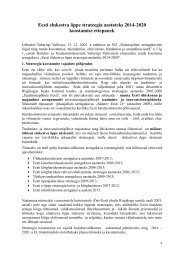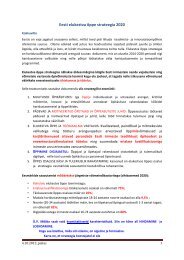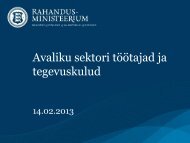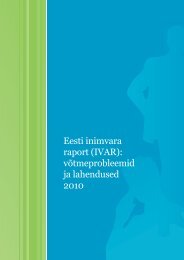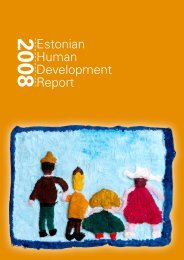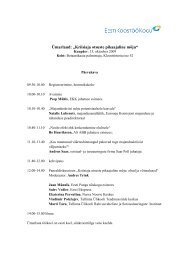DEVELOPMENT
The pdf-version - Eesti Koostöö Kogu
The pdf-version - Eesti Koostöö Kogu
You also want an ePaper? Increase the reach of your titles
YUMPU automatically turns print PDFs into web optimized ePapers that Google loves.
monitoring of teaching, the schools’ autonomy in the<br />
selection of teachers, and the determination of the<br />
study content. The referenced authors also find that<br />
national testing has a positive effect if the results are<br />
used only to compare schools, and not to group children<br />
into different tracks of study.<br />
However, assuming that impact of socio-economic<br />
deprivation will decline, one should carefully monitor<br />
whether the current good performance of Estonia’s<br />
education system will continue in the future. Possible<br />
risks are related to the liberal approach to the principle<br />
of school choice. Although the right of the parents to<br />
choose the school for their child is prevalent in many<br />
countries, Estonia is different because mechanisms are<br />
not utilised to balance the school choice model that has<br />
a segregating effect. Thus, an analysis of the children<br />
starting school in Tallinn from 2008 to 2011 showed<br />
that admission to the popular schools in the city centre<br />
was more probable if the child had completed a paid<br />
prep-school, his or her mother had a higher education,<br />
the father had a good income and they lived in the city<br />
centre (Põder, Lauri 2013). Therefore, several segregation<br />
mechanisms are simultaneously at work – an advantage<br />
based on residence in the city centre schools, admission<br />
testing, and the autonomy of the school director in<br />
deciding whether to admit a child – which intensify each<br />
other. Thus, several problems accompany the neoliberal<br />
education agenda that promotes competition. It has<br />
been discovered that it is more harmless to promote the<br />
principle of school choice in mature countries where the<br />
following preconditions exist: uniform school networks,<br />
parents who are experienced at making selections, and<br />
the ability and desire to consider collective interests<br />
experiences (Perry 2007).<br />
1.3.4<br />
The educational contribution<br />
to economic development<br />
The OECD and IEA surveys provide the answer to the<br />
question of which education systems are among the best<br />
in the world, but based on them, we cannot draw any<br />
direct conclusions about how education systems can<br />
satisfy economic needs. In its education sub-index, the<br />
Global Competitiveness Index, which is computed by<br />
the World Economic Forum, has focused on this topic.<br />
In order to measure the conformity of education with<br />
the needs of the economy, the experts used a scale of 1<br />
to 7 to evaluate the conformity of the following aspects<br />
of the education system with a free market economy: the<br />
quality of the teaching of the sciences in the schools; the<br />
quality of the schools of economics and management;<br />
the utilisation of the Internet in the schools; and the<br />
training opportunities for employees in the workplace.<br />
Unlike the PISA and IEA surveys, in which the respondents<br />
are stakeholders in the education system (students,<br />
teachers, school administrators), the World Economic<br />
Forum’s data reflects the positions of experts outside the<br />
education systems, i.e. the consumers of the education<br />
product, the educational outcome.<br />
Estonia is above average in all the indicators,<br />
however, it stands out for the relatively low satisfaction<br />
Figure 1.3.7<br />
Percentage of students with low and high levels of<br />
performance (%) in mathematics and the country’s<br />
average score, PISA 2009.<br />
Below the base level<br />
Percentage<br />
Singapore (562)<br />
Rep. of Korea (546)<br />
Finland (541)<br />
Switzerland (534)<br />
Netherlands (526)<br />
New Zealand (519)<br />
Belgium (515)<br />
Germany (513)<br />
Estonia (512)<br />
Denmark (503)<br />
Slovenia (501)<br />
Slovakia (497)<br />
France (497)<br />
OECD average (496)<br />
Austria (496)<br />
Poland (495)<br />
Sweden (494)<br />
Czech Republic (493)<br />
Great Britain (492)<br />
Hungary (490)<br />
Luxembourg (489)<br />
Portugal (487)<br />
Ireland (487)<br />
Italy (483)<br />
Spain (483)<br />
Latvia (482)<br />
Lithuania (477)<br />
Greece (466)<br />
Israel (447)<br />
Bulgaria (428)<br />
Uruguay (427)<br />
Romania (427)<br />
Chile (421)<br />
Percentage<br />
Source: OECD<br />
Top level<br />
60 50 40 30 20 10 0 10 20 30<br />
60 50 40 30 20 10 0 10 20 30<br />
with the level of the management schools and the conformity<br />
of the education to the needs of the free market<br />
as a whole. This reflects a greater concern about the<br />
insufficient link to the economy. The World Economic<br />
Forum’s Global Competitiveness Report states that the<br />
Estonian Employers Confederation considers the inadequate<br />
preparation of the workforce to be the main<br />
drag on Estonia’s economic development (WEF 2012).<br />
Since the given index is based on the assessments provided<br />
by local experts, the critical attitude of the local<br />
experts also affects the value of the index. By comparing<br />
the educational indicators of global competitiveness<br />
with the PISA results, it turns out that the Estonian<br />
experts are more critical than the others when assessing<br />
the level of the schools in their country. Thus, the<br />
performance of the Estonian students in mathematics<br />
and the sciences is higher than that of the Swiss and<br />
Belgian students, but the Estonian economic experts<br />
give the level of teaching in our schools a much lower<br />
36<br />
Estonian Human Development Report 2012/2013



